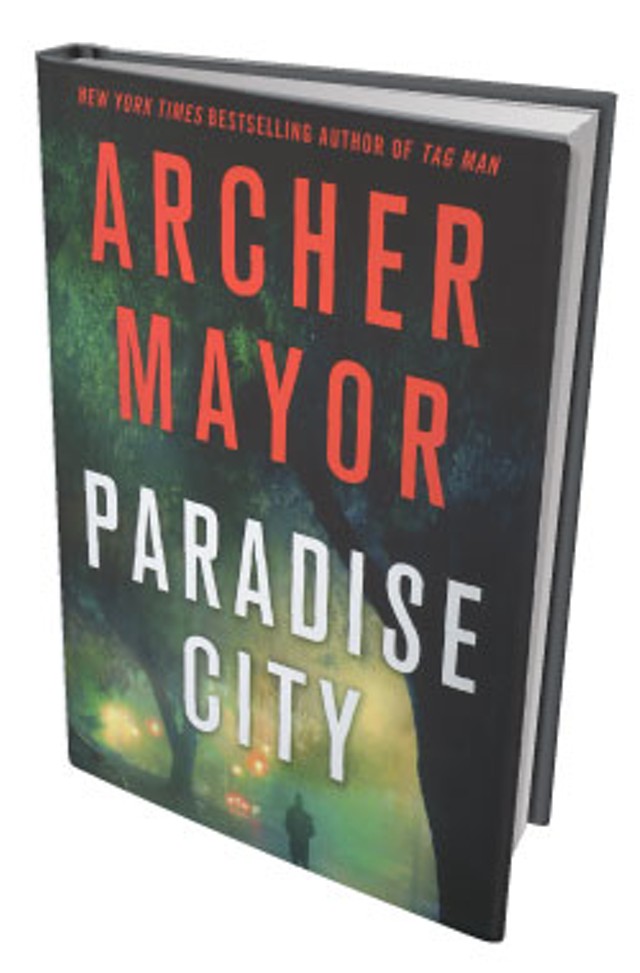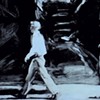Published November 28, 2012 at 7:38 a.m.
It may be odd in a book review to comment on the last part first, but the ending of Archer Mayor’s recently published Paradise City is also a little odd. That’s because there are several of them, and possibly one too many.
Chapter 24 wraps up in the way that crime novels do: revisiting major players, including one in a hospital; sweeping up more bad guys; tying loose ends and providing a sense of closure. But the final finale feels, to this reader, superfluous — a coda in which Mayor drops in on a pair of characters who, frankly, are not very likable. Why give them equal time with more central figures? It’s certainly not to set up a sequel; this is Mayor’s 23rd volume in the Joe Gunther series, and, while the collection revolves around a set of individuals who move forward in time, each novel has a completely different story and peripheral personnel. Mayor finishes Paradise City with two of the book’s least sympathetic characters (at least among the non-murderers), and fails in his attempt to make both of them more so. In fact, giving the pair redeeming qualities on virtually the last page not only seems pointless, it’s just not very plausible. It’s a jarring last step in an otherwise fluid read.
That aside, it is to the Newfane author’s immense credit that he has invented so many stories and characters over the years and has done so again with Paradise City. At the same time, he has built on the stories of his core cast. By contrast with series in which the protagonists seem essentially frozen in time, Joe Gunther and his gang evolve, grow older, and experience entirely believable human pleasures, sorrows and complications. For longtime fans, reading Mayor’s annual volume is like a literary family reunion. Of course, the members of this branch are all cops.
Another of Mayor’s talents is creating a sense of place and imbuing it with history that, rather than interrupting the story, provides valuable context. And, for this author, context is a backdrop with almost fatalistic implications for the ne’er-do-wells who populate his stories. Mayor/Gunther doesn’t excuse or forgive criminal behavior; he simply sees where criminals are coming from, as it were.
The series is set primarily in Vermont, with locales more or less familiar to residents of this state — particularly those around Brattleboro. In Paradise City, however, Gunther and gang get out of town; while associated crimes in Vermont and Boston launch the plot, most of the action takes place in Northampton, Mass.
Once the chief of police in Brattleboro, Gunther has for some years been head of the Vermont Bureau of Investigation, a fictional outfit that Mayor has had to explain in each book since he created it. Thankfully, his introduction to the VBI is briefer and smoother in Paradise City. For his long and largely successful tour of duty in both organizations, Gunther is legendary both in Vermont law enforcement and to his colleagues in Massachusetts.
Mayor makes a point of describing the delicate dance of cops in different jurisdictions working together — this is, after all, a “police procedural.” The insider info is both interesting and realistic: Mayor doesn’t omit the frustrating budgetary constraints of the small departments run by Gunther and Northampton chief Dan Siegel. And he presents Boston detective Jimmy McAuliffe — a dedicated but somewhat jaded urban cop — with the ignominy of being upstaged by a citizen’s amateur investigations.
That citizen is Mina Carson, granddaughter of a wealthy elderly woman whose home is burgled in tony Beacon Hill. It isn’t a simple B&E; when Billie Hawthorne confronts the robbers in her kitchen, one of them brutally knocks her to the floor, kicks her in the head and sends the old lady into a coma. And so Mina embarks on a determined — and dangerous — quest to find out whodunit.
So do Jimmy McAuliffe, Dan Siegel and Joe Gunther, once the Boston robbery is linked to a home invasion — with arson — in Vermont and then to a criminal ring focused on antique jewelry that seems to be headquartered in Northampton. This chain eventually leads to illegal alien workers who transform the stolen gems and baubles into other pieces for highly profitable resale at Northampton’s most successful jewelry studio. The cops take a while to uncover all this, of course, and therein hangs a convoluted but mostly riveting tale. Along the way, there are more killings.
If some of the lower-level thieves are one card shy of a full deck, the masterminds behind the thieving and alien-smuggling operation are uncannily sophisticated. Think untraceable phones, anonymous communications via video in obscure locations, digitally altered voices and every other contemporary crime cliché. Even the cops observe, as they are repeatedly outwitted, that these people have watched too many movies. It will not spoil things to say that good old-fashioned police work ultimately prevails, albeit with a larger body count than one might have expected.
One of the men taken down in this story is Willy Kunkle, Gunther’s assholic right-hand man, who, in Paradise City, is even more emotionally conflicted than usual. He’s got family, having previously moved in with fellow detective Sammie Martens and fathered a baby daughter. In brief, the troubled loner doesn’t know how to handle love. What he does know but ignores one time too many is that chasing bad guys without backup is unwise. And it would spoil things to say how that turns out.
Along with the book’s multiple tidy endings, another conclusion is clear: Its title is a bitter euphemism. For some of these characters, “paradise” is lost. Others find it, not as a place but as a devilishly elusive state of mind.
"Paradise City" by Archer Mayor, Minotaur Books. 306 pages. $25.99.
More By This Author
Speaking of Book Review
-

Review of Sen. Patrick Leahy's New Memoir
Aug 26, 2022 -

Book Review: Pete the Cat and His Magic Sunglasses
May 27, 2016 -

Book Review: Penguin Cha-Cha
Mar 31, 2016 -

Book Review: Dog vs. Cat
Dec 16, 2015 -

Book Review: The Hummingbird by Stephen P. Kiernan
Nov 4, 2015 - More »
Comments
Comments are closed.
From 2014-2020, Seven Days allowed readers to comment on all stories posted on our website. While we've appreciated the suggestions and insights, right now Seven Days is prioritizing our core mission — producing high-quality, responsible local journalism — over moderating online debates between readers.
To criticize, correct or praise our reporting, please send us a letter to the editor or send us a tip. We’ll check it out and report the results.
Online comments may return when we have better tech tools for managing them. Thanks for reading.















































